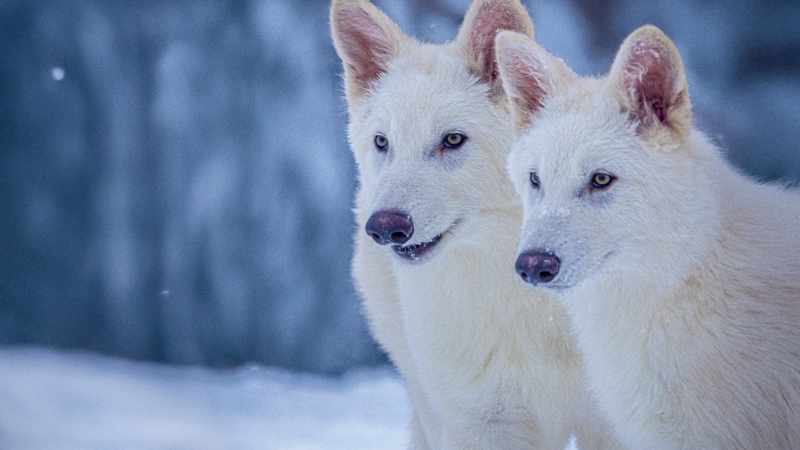A biotech company says it has bred three pups with traits of the extinct dire wolf
A biotech company says it has bred three animals with key physical features of the dire wolf — a species that has been extinct for more than 12,000 years.
Colossal Biosciences says it used novel gene-editing technology to alter gray wolf DNA that led to the birth of the pups. Dire wolves recently featured prominently in the HBO series Game of Thrones.
“Our team took DNA from a 13,000 year old tooth and a 72,000 year old skull and made healthy dire wolf puppies,” Colossal CEO Ben Lamm said in a statement
“It was once said, ‘any sufficiently advanced technology is indistinguishable from magic.’ Today, our team gets to unveil some of the magic they are working on and its broader impact on conservation,” Lamm added.
Colossal also announced that it had bred four cloned red wolves, the most endangered wolf species in the world, and said its technology could be used to help threatened animal populations across the globe rebound.

But some in the scientific community object to the Dallas-based firm’s claim to have returned the dire wolf — or Aenocyon dirus — from extinction with its process of using genetically modified gray wolf embryos.
“It is all very misleading,” Vincent Lynch, a professor of biological sciences at the University at Buffalo, told NPR in an emailed statement. “It is not a dire wolf; it is a gray wolf clone with some mutations that make it superficially resemble a dire wolf.”
Colossal says it extracted dire wolf DNA from two fossils — a roughly 13,000-year-old tooth found in Ohio and a 72,000-year-old inner ear bone discovered in Idaho.
The company used what it learned about dire wolves from that ancient DNA to modify the cells of the modern gray wolf, which it says is the closest living relative to the prehistoric species. Colossal scientists made 20 edits to the gray wolf genome — including 15 edits in 14 genes that were the “exact extinct variants” — to create animals with dire wolf traits such as larger bodies and thicker, paler coats.

That modified DNA was then used to create embryos, which were implanted into surrogate female dogs. Three healthy pups with dire wolf traits were born, which the company named Romulus, Remus and Khaleesi.
Still, critics have questioned whether the three dire wolf pups are in fact the real thing — or a version of the gray wolf meant to look like it.
“Dire wolves were a distinct species, genetically distant from gray wolves. You can’t ‘bring back’ a species just by making another animal look vaguely similar,” Maarten Larmuseau, a professor of genetic genealogy at KU Leuven in Belgium, said in an emailed statement. “It’s an interesting biotech exercise, but behavior, ecology, and learned social traits matter just as much as DNA, and those can’t simply be engineered.”
In response to some of the criticism, the company said it was not trying to create an exact genetic replica of the dire wolf, but rather produce animals that can fill the void that dire wolves left in nature and carry the animal characteristics that were lost when they went extinct.
“For anyone working on de-extinction, the goal has never been perfect genomic recreation, but rather restoring the functional traits and ecological role of lost species,” Colossal said in a statement.
The company added that the three pups have “actual dire wolf genes that haven’t been present on Earth since they went extinct” and that the technology Colossal has developed has “immediate applications for endangered species facing extinction today.”
Colossal has also been trying to bring back other extinct species, such as the woolly mammoth and the Tasmanian tiger.
The dire wolf pups live on an ecological preserve over 2,000 acres in size, where they are tended to by a 10-member full-time care staff and monitored using cameras, security personnel and drones.
U.S. lawmakers wrap reassurance tour in Denmark as tensions around Greenland grow
A bipartisan congressional delegation traveled to Denmark to try to deescalate rising tensions. Just as they were finishing, President Trump announced new tariffs on the country until it agrees to his plan of acquiring Greenland.
Trump has rolled out many of the Project 2025 policies he once claimed ignorance about
Some of the 2025 policies that have been implemented include cracking down on immigration and dismantling the Department of Education.
Can exercise and anti-inflammatories fend off aging? A study aims to find out
New research is underway to test whether a combination of high-intensity interval training and generic medicines can slow down aging and fend off age-related diseases. Here's how it might work.
The 2026 Olympics are the most widespread in history. See what’s happening where
Competitions will be hosted at 25 venues spanning an area of more than 8,000 square miles. Here's what's happening at each of the four main clusters.
High-speed trains collide after one derails in southern Spain, killing at least 21
The crash happened in Spain's Andalusia province. Officials fear the death toll may rise.
United Nations leaders bemoan global turmoil as the General Assembly turns 80
On Saturday, the UNGA celebrated its 80th birthday in London. Speakers including U.N. Secretary-General António Guterres addressed global uncertainty during the second term of President Trump.






